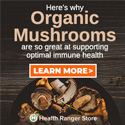
Majority of Obese People Fail to Recognize Their Own Obesity
Saturday, March 06, 2010 by: David Gutierrez, staff writer
Tags: obesity, adults, health news
- Pfizer's RSV vaccine linked to preterm births as drug giant CONCEALED RISKS from pregnant women in unethical clinical trials
- Dane Wigington exposes climate engineering as ‘All-Out Weather and Biological Warfare’
- Sen. Johnson demands COVID vaccine makers hand over all documents, communications, as evidence against their products reaches a climax
- Photonic revolution: New chips process data using light instead of electricity
- Criminal referral requests filed against Fauci and top COVID officials in seven states
- EU pauses retaliatory tariffs as Trump temporarily halts new duties
- Israeli lobbyists boast of controlling US national security policy in leaked AIPAC audio
- The humble Potato: Nutritional benefits and how to enjoy it the healthy way
- Analysis: The coming economic collapse, a mass uprising and Trump's three secret weapons to halt the growing revolt
- Tulsi Gabbard leads charge against the Biden regime’s global censorship of the 'Disinformation Dozen'
- Aerosolized bioweapons? Strange “diploid biomasses” falling out of the sky in Florida captured under the microscope
- Aluminum, essential to vaccine science, also causes serious health conditions, including chronic fatigue, neurodegenerative diseases, macrophagic myofasciitis
- Fauci is back in the limelight, and he’s busy promoting a future COVID or FLU pandemic
- DOGE unveils $400M unemployment fraud scandal: Toddlers, futuristic birthdates fuel outcry
- Shedding light on the dark side of MMR vaccines: How vaccinated individuals SPREAD MEASLES & put the vulnerable at risk
- Chemtrails unveiled: How the CIA and Big Business are manipulating the weather for profit
- U.S. lawmakers investigate Meta over alleged China collaboration
- Mike Adams releases country western hit single: Goin’ Back in Time is Comin’ Home
- Aerosolized bioweapons? Strange “diploid biomasses” falling out of the sky in Florida captured under the microscope
- Widespread social and economic unrest: Steve Quayle issues urgent financial warning of imminent asset collapse in new interview with Mike Adams
- Tulsi Gabbard leads charge against the Biden regime’s global censorship of the 'Disinformation Dozen'
- Fauci is back in the limelight, and he’s busy promoting a future COVID or FLU pandemic
- Analysis: The coming economic collapse, a mass uprising and Trump's three secret weapons to halt the growing revolt
- Kiss Your Genetic Privacy Good-Bye! 23andMe Gets Green Light to Sell Your Intimate Genetic Details to Anyone They Want
- CLOT SHOT PLANDEMIC UNFOLDING: Fibrous, rubbery clots caused by covid injections have prion-like seeding activity
- Mike Adams releases country western hit single: Goin’ Back in Time is Comin’ Home
- DEATH by VACCINE or face PRISON time: Canadian Freedom Convoy leaders CONVICTED for protesting forced vaccination during the Covid Plandemic
- Tulsi Gabbard takes aim at censorship: Justice for the ‘Disinformation Dozen’
- How Israeli military-connected corporations are secretly controlling your online privacy
- European Court of Justice: Healthcare professionals who promoted or administered COVID-19 vaccines are CRIMINALLY LIABLE for any harm caused
- Defunding DEADLY mRNA jabs: Government funding for mRNA technology being scrutinized and sidelined until proven "safe and effective" for real
- U.S. lawmakers investigate Meta over alleged China collaboration
- Federal employees whine over DOGE's new directive requiring them to do a 5-point summary of weekly accomplishments
- U.S. approves new Russian ambassador as diplomatic thaw continues
- Trump administration poised to overhaul crypto regulations with new SEC leadership
- I Want My Bailout Money – new song and music video released by Mike Adams
- Newly released JFK files reveal Pentagon's role in creating Lyme disease and covid in the same lab
- Analysis: The coming economic collapse, a mass uprising and Trump's three secret weapons to halt the growing revolt
- Mike Adams releases country western hit single: Goin’ Back in Time is Comin’ Home
- MEDICAL BOMBSHELL: FDA admits Covid mRNA 'Vaccines' CAUSE CANCER
- Aerosolized bioweapons? Strange “diploid biomasses” falling out of the sky in Florida captured under the microscope
- Trump reverses course on Gaza plan, says “nobody is expelling Palestinians”
- Dr. Mike Yeadon releases 15-minute testimony - WATCH - about genocidal intent of COVID “vaccines”
- Kiss Your Genetic Privacy Good-Bye! 23andMe Gets Green Light to Sell Your Intimate Genetic Details to Anyone They Want
- 5 Simple steps to boost your brainpower: How to strengthen executive function in a distracted world
- A lack of integrity in Academia: Harvard professor found GUILTY of fraudulent research to promote CRT theory
- The Health Ranger releases “Vaccine Zombie” song and music video, using AI-animated zombies for the music video
- California's social media censorship law struck down: A victory for free speech or a threat to online safety?
- Rep. Nancy Mace introduces bill to ban biological males from female facilities on federal property
- EPA advisor admits the agency is funneling billions to climate groups ahead of Trump’s return to White House
- Survival 101: Effective EMF blocking techniques
- OpenAI whistleblower who dissented against how the company trained ChatGPT found dead
- Space war brewing? Russia threatens to destroy Starlink satellites
- European Court of Justice: Healthcare professionals who promoted or administered COVID-19 vaccines are CRIMINALLY LIABLE for any harm caused
- Red Cross issues warning to stop blood plasma donations from vaccinated people
- Scientists confirm: GENIUS brain function can be spontaneously unleashed in humans without any apparent cause
- EPA advisor admits the agency is funneling billions to climate groups ahead of Trump’s return to White House
- HYSSOP: What research reveals about the health benefits of this ancient holy herb
- Two containers with completed ballots fall out of truck in Florida
- Newly released JFK files reveal Pentagon's role in creating Lyme disease and covid in the same lab
- Global leaders unite to clamp down on “misinformation” with UN-backed Cascais Declaration
- Fully vaccinated about to see “tsunami” of illness and death, warns virologist
- BREAKING: 2025 NDAA authorizes mandatory military draft of WOMEN across America… as Pentagon pursues global NUCLEAR war with both Russia and China at the same time
- Michael Yon warns of a ZIONIST TAKEOVER in Trump’s second administration
- Ozempic and Wegovy weight loss drugs are injectable LIZARD VENOM PEPTIDES that may unleash a devastating wave of organ failure… side effects align with symptoms of SNAKE BITES
- The Health Ranger releases “Vaccine Zombie” song and music video, using AI-animated zombies for the music video
- BOMBSHELL: DNA testing kits are a SCAM to develop ethnic-specific bioweapons
- Mike Adams releases country western hit single: Goin’ Back in Time is Comin’ Home
- Israeli soldiers accused of even more torture and abuse in the West Bank
- These 13 countries just signed an agreement to engineer a global FAMINE by destroying food supply
- NASA admits that climate change occurs because of changes in Earth’s solar orbit, and NOT because of SUVs and fossil fuels
- RFK Jr. clears key hurdle: Sen. Susan Collins backs controversial HHS nominee, signaling a new era for health policy
"In my view there is a very clear tendency for individuals with obesity to feel that they do not stand out from the crowd," says Jonathan Pinkney, of the Association for the Study of Obesity.
Researchers interviewed 2,000 people about their height, weight and perception of their size and diet. While only 7 percent of those interviewed classified themselves as "obese," in fact more than 25 percent of them fell into that category.
Obesity is commonly defined as having a body mass index above 30. Body mass index (BMI) is calculated by dividing a person's mass in kilograms by the square of their height in meters. A healthy BMI falls between 18.5 and 24.9, while a BMI of 25 to 30 is considered overweight.
Health professionals believe that as more of the population becomes overweight and obese, people's perception of normal changes.
"If some 4 percent of women now have a BMI of more than 40, then arguably you need this sort of BMI to begin to look obviously obese when you walk down the street," Pinkney said. "That may be one reason why self-reported obesity underestimates its true prevalence."
Even media coverage of the obesity epidemic contributes to the problem, according to Krystyna Matyka of the University of Warwick Medical School. By focusing on the largest of the large, the media make the majority of the obese seem small by comparison.
"If you see people with BMI of over 50, say, and you have a BMI of 40 then you may well think you aren't too bad," Matyka said.
A number of recent studies have shown that parents also tend to underestimate the obesity of their children. Complicating this problem is the stigma still associated with being overweight, said Susan Jebb of the Medical Research Council.
"All the discussion around overweight children is so negative that it is not surprising parents find it difficult to acknowledge there is a problem," she said. "It's a defense mechanism."
Sources for this story include: news.bbc.co.uk.
Obesity at FETCH.news
Get independent news alerts on natural cures, food lab tests, cannabis medicine, science, robotics, drones, privacy and more.
Take Action: Support Natural News by linking to this article from your website
Permalink to this article:
Embed article link: (copy HTML code below):
Reprinting this article:
Non-commercial use OK, cite NaturalNews.com with clickable link.
Follow Natural News on Facebook, Twitter, Google Plus, and Pinterest
Science News & Studies
Medicine News and Information
Food News & Studies
Health News & Studies
Herbs News & Information
Pollution News & Studies
Cancer News & Studies
Climate News & Studies
Survival News & Information
Gear News & Information
News covering technology, stocks, hackers, and more



"Big Tech and mainstream media are constantly trying to silence the independent voices that dare to bring you the truth about toxic food ingredients, dangerous medications and the failed, fraudulent science of the profit-driven medical establishment.
Email is one of the best ways to make sure you stay informed, without the censorship of the tech giants (Google, Apple, Facebook, Twitter, YouTube, etc.). Stay informed and you'll even likely learn information that may help save your own life."
–The Health Ranger, Mike Adams













































